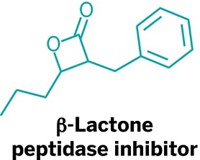Advertisement
Grab your lab coat. Let's get started
Welcome!
Welcome!
Create an account below to get 6 C&EN articles per month, receive newsletters and more - all free.
It seems this is your first time logging in online. Please enter the following information to continue.
As an ACS member you automatically get access to this site. All we need is few more details to create your reading experience.
Not you? Sign in with a different account.
Not you? Sign in with a different account.
ERROR 1
ERROR 1
ERROR 2
ERROR 2
ERROR 2
ERROR 2
ERROR 2
Password and Confirm password must match.
If you have an ACS member number, please enter it here so we can link this account to your membership. (optional)
ERROR 2
ACS values your privacy. By submitting your information, you are gaining access to C&EN and subscribing to our weekly newsletter. We use the information you provide to make your reading experience better, and we will never sell your data to third party members.
Biological Chemistry
Death By Reduction
Chemical Biology: A cysteine-rich defensin peptide turns antimicrobial when reduced
by Sarah Everts
January 20, 2011
| A version of this story appeared in
Volume 89, Issue 4
The human innate immune system produces antimicrobial peptides that keep the trillions of microbes that cohabit peoples' bodies in check. Now, researchers led by Jan Wehkamp of the Institute for Clinical Pharmacology, in Stuttgart, Germany, report that one of these peptides—β-defensin 1, long thought to be feebly antimicrobial—becomes a deadly weapon against microbes when its cysteine residues are reduced (Nature, DOI: 10.1038/nature09674).
This short peptide is copiously produced by human epithelial cells, particularly those in the gut, where many bacteria live and where conditions are anaerobic and therefore reducing. Previously, β-defensin 1's activity had only been studied in oxygen-rich aerobic conditions. Wehkamp’s team found that when the peptide's three cysteine bridges are broken in anaerobic and reducing conditions, the molecule becomes a potent killer of Gram-positive bacteria and fungi. This new route for enhancing antibiotic activity could aid the development of other antibacterial agents as well.
Robert I. Lehrer, a medical researcher at the University of Califonia, Los Angeles, comments in Nature hat the "drastically" changed activity of the reduced β-defensin 1 peptides appears to be inducing the bacteria to self-destruct (DOI: 10.1038/469309a).





Join the conversation
Contact the reporter
Submit a Letter to the Editor for publication
Engage with us on Twitter